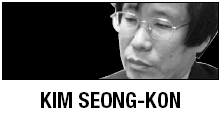We should be more discrete and modest when it comes to evaluating the popularity of Korean culture overseas.
With the rise in popularity of Korean television dramas and movies across Asian countries, the headlines of our newspapers invariably proclaim, “Hallyu (the Korean Wave) has conquered Asia.” When our K-pop group singers succeeded in attracting a huge crowd in Paris and London, our media once again declared, “K-pop has conquered Europe.” In fact, a K-pop entertainment agency representative rather audaciously announced at a press conference that, “We did what even Genghis Kahn couldn’t do.” Alas! He should have exercised discretion not to utter such an inconsiderate remark in public, which could provoke even supportive Europeans who favor Korean culture.

A few days ago, one of our television programs featured the popularity of Korean television dramas in Hawaii. The closing remark of the announcer was quite embarrassing, if not appalling: “We have conquered Europe already. Now it is the time for us to conquer the United States.” Granted he was referring to cultural, not military and territorial conquest, but his grandiose statement still sounded egregious. Our reporters tend to vastly exaggerate news that involves Korea’s popularity overseas. Contrary to their audacious declaration, the popularity of K-pop overseas has nothing to do with conquering a nation. Besides, our pop singers have performed only in two European countries so far.
Nevertheless, Korean newspapers these days seem to be determined to run a “Korea has conquered . . .” series. A few days ago, for example, a newspaper carried an article entitled, “Korean food has conquered the United Kingdom,” and another newspaper declared, “K-pop has recently conquered Europe, and Korean classical music has also conquered the world at the International Tchaikovsky Competition.” Reporters should be neutral, reporting only the objective truth. But our reporters always try to trigger nationalism and patriotism to draw readers’ attention.
Of course, we should acknowledge the enormous popularity of our pop culture in other countries. Korean television dramas are now widespread even in Middle Eastern countries, and Korean movies have won several major awards in international film festivals including the Berlin, Cannes and Venice film festivals. In addition, Korean pop singers are superb performers who can sing and dance simultaneously with amazing charm and elegance. And all of them are quite good-looking too.
Traditionally, the Korean people are talented in singing and dancing. They say that it runs in our blood. Today, we impress people around the world with our God-given musical skills. Moreover, Korea has a strong tradition of oral storytelling. It is no wonder that Korean television dramas have a strange charming effect that ensnares viewers. Once you begin to watch a show, you will become addicted and cannot walk away until the last episode. The storytelling skills of Korean scriptwriters are so exquisite that viewers cannot help but anxiously wait for the next episode to air. It is common for the streets of Korea to be nearly empty in the evenings when a popular television drama is on air. Amazingly, the same thing happens in some foreign countries, such as Uzbekistan and Kazakhstan. Through such phenomena, one can see the strong appeal and irresistible charm of Korean television dramas. When you turn on the TV these days, you are likely to find Western crime dramas occupying virtually all channels: “CSI,” “Criminal Minds,” “Missing,” “Law and Order,” “Closer to Home,” “NCIS,” “Identity,” “Leverage” and “Numbers,” to name but a few. Those who are fed up with the inundation of crime dramas may find Korean television dramas to be more humane and refreshing.
These days, Korean actors often appear in Hollywood movies as well. For example, Lee Byeong-heon appeared in “G.I. Joe: The Rise of Cobra,” Rain in “Speed Racer,” Shim Hyung-rae in “The Last Godfather,” and Jang Dong-gun in “The Warrior’s Way.” But that does not necessarily mean that Korean actors are conquering Hollywood. Chinese stars such as Jackie Chan, Zhang Ziyi and Chow Yun-fat have appeared in many major Hollywood movies, but we do not say that Chinese actors are conquering Hollywood.
A few weeks ago, a newspaper reporter called me to hear my opinion on the unexpected success of the Korean novelist Shin Kyung-sook’s “Please Look after Mom” in the States. While explaining the possible reasons for the success of the novel in the American book market, I mentioned that perhaps it did particularly well because many Korean-American readers purchased the book, or because Amy Chua’s recent bestseller, “Battle Hymn of the Tiger Mother” contributed to rising interest in Asian literature. But that was not the answer the reporter had expected me to say; she seemed to expect me to announce that Korean literature had now conquered the United States.
We should be more discrete and modest when it comes to evaluating the popularity of Korean culture overseas. Conquering a nation is an imperialistic act. Koreans are known to be hostile to cultural imperialism. How, then, can we try to conquer other countries, even if we mean cultural and metaphoric conquer? We should perceive the success of our cultural media as a type of cultural exchange or cross-cultural interaction instead.
By Kim Seong-kon
Kim Seong-kon, a professor of English at Seoul National University, is editor of the literary quarterly “21st Century Literature.” ―Ed.








